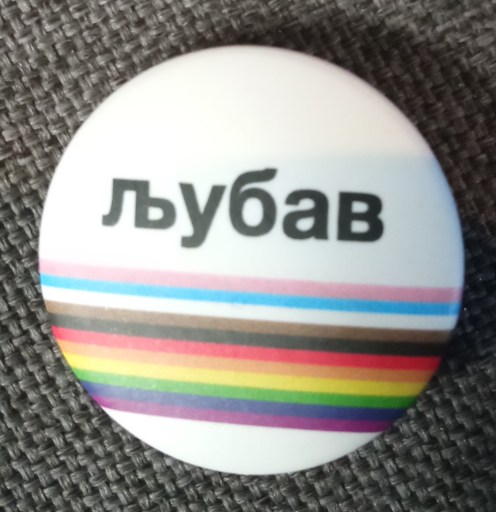
This year the capital of Serbia, Belgrade was the host of the pan-European international LGBTIQA+ event EuroPride. The event was significant because this was the first EuroPride organized beyond EEA and in Southeast Europe. In order to mark this occasion, Wikimedia Serbia organized an international edit-a-thon Wiki Loves EuroPride, during which Wikipedia volunteers in Europe and all over the world wrote and improved articles on topics of LGBTIQA+ terms, persons, organizations, festivals, books, cinematography, and all other topics that celebrate human rights and differences.
The goal of this event was to combat the prejudice and discrimination that members of the LGBTIQA+ community face daily by spreading free knowledge on Wikipedia and other Wiki projects. Wiki Loves EuroPride was supported by Wikimedia España, GLAM Macedonia, Wikimedia Community User Group Turkey, Wikimedians of Albanian Language User Group, Wikimedia Community User Group Greece, and community from Serbo-Croatian and Bosnian Wikipedia.
Organization of Wiki Loves EuroPride
The first step in the preparation of the Wiki Loves EuroPride edit-a-thon was to create a page on Meta with a table containing a list of articles showing whether they exist in various language editions of Wikipedia or not. This method is also beneficial because it allows participants to work on translating articles if sources and literature on a given item do not exist in their language.
The second step includes initiating contact with Wikimedia affiliates and communities and inviting them to join and support this event. The responses were quite good as many affiliations and User Groups wanted to support the event, at least by informing their communities about it. A lot of communities from the Balkans went one step further and decided to organize local events dedicated to LGBT+ topics, in some cases for the first time ever. This only shows that despite the fact that societies in this region are considered to be traditional and conservative, people from Balkans are more than willing to fight for human rights and diversity by spreading free knowledge about LGBT+ topics.
Results
The edit-a-thon lasted from the 12th until the 18th of September. During this period 55 participants from 10 language versions of Wikipedia wrote 166 new articles, and 4 articles were improved. The best results were achieved on Serbian, Spanish, and Macedonian Wikipedia. Besides Wikipedia, participants were also active on Wikidata. Also, Wikimedia Commons is now enriched with 48 photos from the Pride parade and other events during EuroPride taken by Wikimedia Serbia volunteers.
Queer History in the Digital: We are here, we are queer – where is our history?
As a part of this international edit-a-thon Wikimedia Deutschland, in collaboration with Wikimedia Serbia, organized an online panel discussion titled “Queer History in the Digital: We are here, we are queer – where is our history?”
During this event, we had the opportunity to present Wiki Loves EuroPride edit-a-thon, and talk about its preparation, challenges we faced along the way, and results. The special guest at this event was ImStevan, an editor from the community on Serbian Wikipedia who is very active in the field of queer topics. He talked about his experience with writing articles on LGBT+ topics, and certain problems that arise in this realm (e.g. the fact that there is a lack of gender natural pronouns in the Serbian language, and that there is a lack of literature on queer topics written in Serbian, etc). Wikipedia editors all over Europe had a chance to discuss various topics such as gender-natural language and what are the best ways to fight for articles on queer topics to stay on Wikipedia.
We asked ImStevan what this discussion and Wiki Loves EuroPride edit-a-thon in general represented for him
“It was a great honour for me to be invited to participate in this discussion and showcase the challenges when it comes to editing articles about queer topics on Wikipedia, and to hear about the experience of other editors. Edit-a-thon is an opportunity for us to put focus on LGBT+ topics on Wikipedia which will certainly contribute to the fight against the lack of knowledge and misinformation about our community that is circulating in the general public and on the Internet. We are the strongest when we are diverse, and because of that, it is really important to encourage others to participate in Wikimedia projects. I hope that in the future more edit-a-thons on this topic will be organized, and maybe some panel discussions during which we can address some questions from the general public about Wikipedia, and motivate more people to contribute to the mission of spreading free knowledge.“
ImStevan
Editor on Serbian Wikipedia
Thanks to international collaboration and mutual hard work and contributions, Wikipedia and other Wiki projects are enriched with important LBGT+ content which deserves to be visible, easily accessible, and well-known.

Can you help us translate this article?
In order for this article to reach as many people as possible we would like your help. Can you translate this article to get the message out?
Start translation